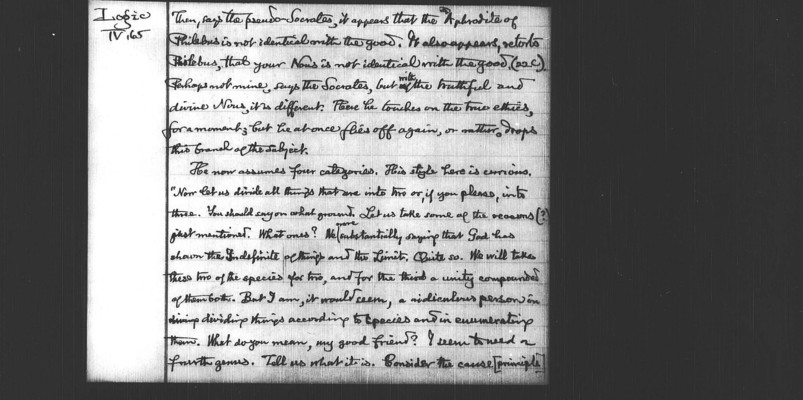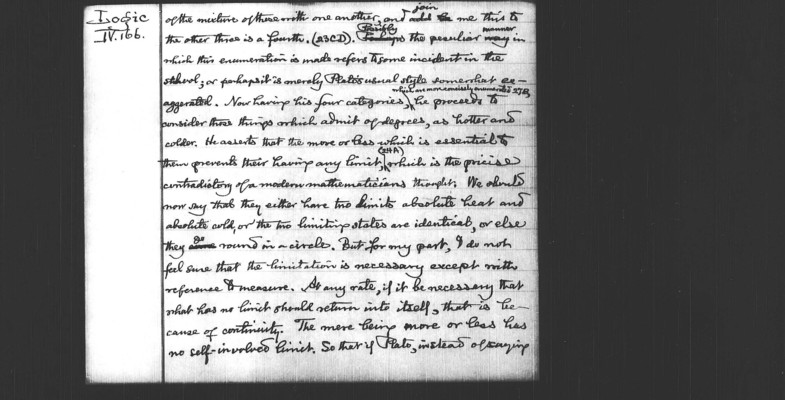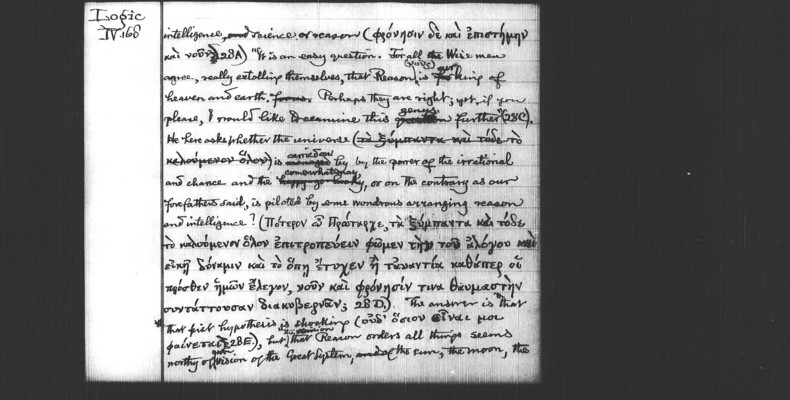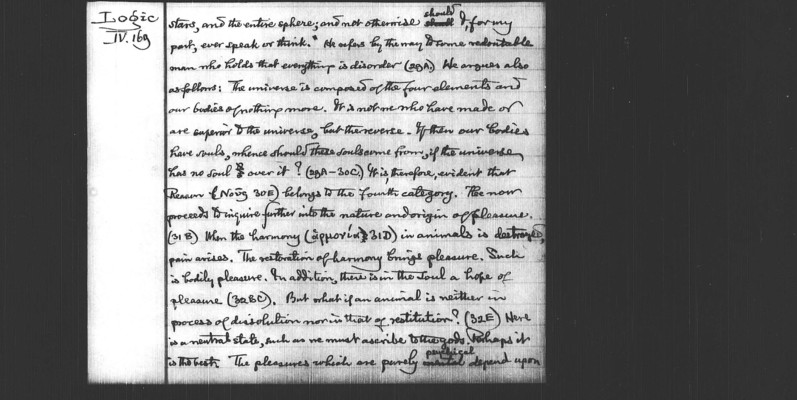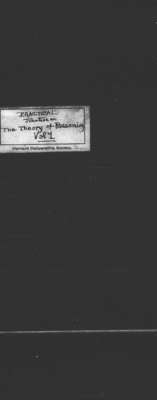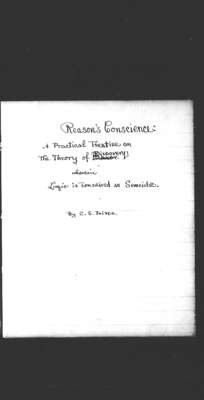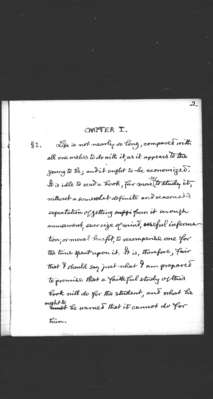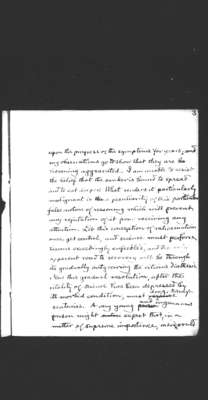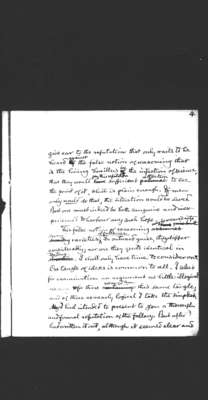Pages That Need Review
MS 434 (1902) - Minute Logic - Chapter IV
159
Logiv IV 165.
Then, says the pseudo-Socrates, it appears that the Aphrodite of Philebus is not identical with the good. It also appears, retorts Philebus, that your Nous is not identical with the good (22C). Perhaps not mine, says Socrates, but with the truthful and divine Nous, it is different. Here he touches on the two ethics, for a moment; but he at once flies off again, or rather, drops this branch of the subject.
He now assumes four categories. His style here is curious. "Now let us divide all things that are into two or, if you please, into three. You should say on what ground. Let us take some up at the reasons (?) just mentioned. What ones? We were substantially saying that God has shown the Indefinite of things and the Limit. Quite so. We will take these two of the species for two, and of the third a unity compounded of them both. But I am, it would seem, a ridiculous person in dividing things according to species and in enumerating them. What do you mean, my good friend? I seem to need a fourth genus. Tell us what it is. Consider the cause [principle]
160
Logic IV 166
of the mixture with one another, and join me this to the other three is a fourth (23CD). Possible the peculiar manner in which this enumeration is made refers to some incident in the school; or perhaps it is merely Plato's usual stule somewhat exaggerated. Now having his four categories, which are more concisely enumerated 27n, he proceeds to consider those things which admit of degrees, as hotter and colder. He asserts that the more or less which is essential to them prevents their having any limit (24A), which is the pricise contradictory of a modern mathematician's thought. We should now say that they either have two limits absolute heat and absolute cold, or the two limiting states are identical, or else they go round in a circle. But for my part, I do not feel sure that the limitation is necessary except with reference to measure. At any rate, if it be necessary that what has no limit should return into itself, that is because of continuity. The mere being more or less has no self-involved limit. So that if Plato, instead of saying
161
Logic IV. 167
, as he does, that absolute cold and absolute head are inconceivable ([ancient greek?] 24B) had contended himself with saying that they do not necessarily involve the idea of absolute limit, we ought to have assented. He, therefore, takes degree as a mark of the first, or indefinite category. But in whatever concept there is no greater or less, sich as equal, double, etc., that he referes to the category of the limit. Anything involving moderaetion and proportion ([ancient greek?] 26A) belongs to the third category: [ancient greek?] 26D. Now the mixed life belongs to the third category. The life of pleasure belongs to the first category, of the Indefinite, because it admits of more or less. It is almost to well known to be said that the Greeks looked upon infinity as essentially imperfect, a soft of chaos insofar as it has no limit. Now he asks in which of the four classes are to be placed.
162
Logic IV. 168
intelligence, good science or reason ([ancient greek? (28A)) "It is an easy question. For all the Wise men agree, really extolling themselves, that Reason (Nous), is our kind of heaven and earth. Perhaps they are right; yet, if you please, I would like to examinie this genus further" (28C). Here he asks whether the universe is carried on by the power of the irrational and chance and the come-what-may, or on the contrary as our forefathers said, is piloted by some wondrous arranging reason and intelligence? ([ancient greek?] 28D). The answer is that first hypothesis is shocking ([ancient greek?] 28E), but the [?] that Reason orders all things orders all things seems worth of [good?] vision of the Great System, of the sun, the moon, the
163
Logic IV. 169
stars, and the entire sphere; and not otherwise should I, for my part, ever speak or think." He refers by the way to some [redoubtable?] man who holds that everything is disorder (29A.) He argues also as follows: The universe is composed of the four elements and our bodies of nothing more. It is not we who have made or are superior to the universe, but the reverse. If then our bodies have souls, whence should these souls come from, if the universe has no soul over it? (29A - 30C.) It is, therefore, evident that Reason (Nous 30E) belongs to the fourth category. He now proceeds to inquire further into the nature and origin of pleasure. (31B) When the harmony ([ancient greek?] 31D) in animals is destroyed, pain arises. The restoration of harmony brings pleasure. Such is bodily pleasure. In addition, there is in the soul a hope of pleasure (32BC). But what if an animal is neither in process of dissolution not in that of restitution? (32E) Here is a netral state, such as we must ascribe to the gods.Perhaps it is the best. The pleasures which are purely psychical depend upon
MS 693 (n.d.) - Reason's Conscience
1
PRACTICAL Treatise on The Theory of Reasoning Vol 1 Harvard Cooperative Society. Ms 693
3
CHAPTER I.
1. Life is not nearly so long, compared with all one wishes to do with it, as it appears to the young to be; and it out to be economized. It is idle to read a book, for more (50) to study it, without a somewhat definite and reasonable expectation of getting [?] from it enough amusement, exercise of mind, useful information, or moral benefit, to recompense one for the time spent upon it. It is, therefore, fair that I should say just what I am prepared to promise that a faithful study of this book will do for the student, and what he ought to be warned that it cannotdo for him.
MS 447-454 (1903) - Lowell Lecture I
6
upon the progress of the symptoms for years; and my observations go to show that they are be becoming aggravated. I am unable to resist the belief that the canker is bound to spread and to eat deeper. What renders it particularly malignant is the a peculiarity of this particular false motion of reasoning which will prevent reputation of it from receiving any attention. Let this conception of ratiocination once get control, and science must perforce become exceedingly enfeebled; and the only apparent road to recovery will be through its gradually outgrowing the vicious? diathesis. Now this gradual resolution, after the vitality of science has been depressed by its morbid condition, must repine drag through centuries. A very young person and ingenuous? person might antici expect that in a matter of supreme importance, men would
7
give ear to the refutation that only waits to be heard against the false notion of reasoning that is the living bacillus in the infection of science, that they would pay this reputation sufficient attention to see the point of it, which is plain enough. If men only would do that, the situation would be saved. But one must indeed be both sanguine and inex perienced to harbour any such hope.
This false notion of reasoning may be [weaved?] into seven varieties of fallacies. In outward guise, they differ considerably; nor are they quite identical in texture. I shall only have time to consider one. One tangle of ideas is common to all. I select for examination an argument as little illogical as any of those weaved from this same tangle; and of those as nearly logical I take the simplest.
I had intended to present to you a thorough and formal refutation of the fallacy. But after I had written it out, although it seemed clear and
